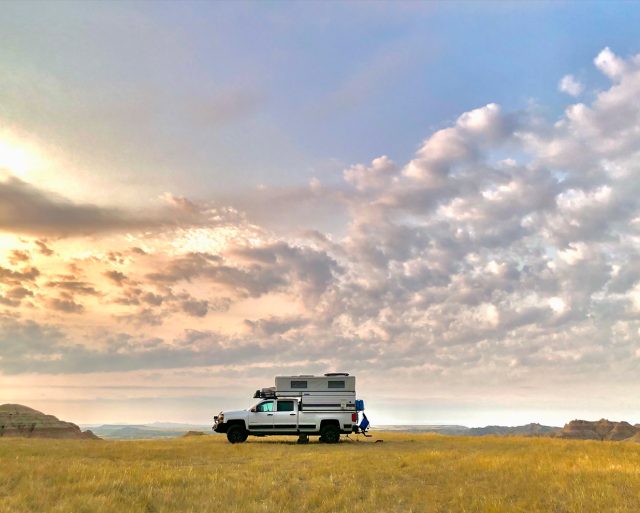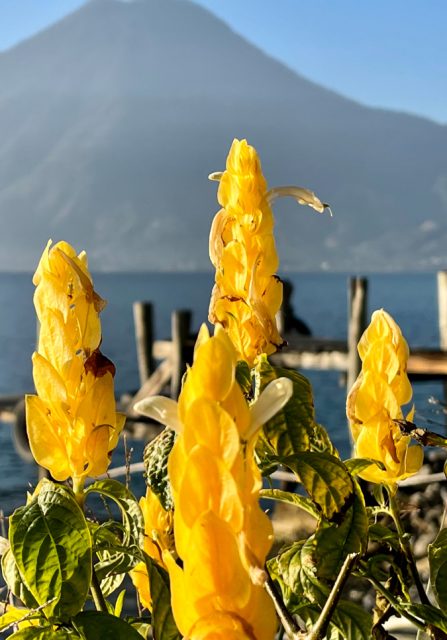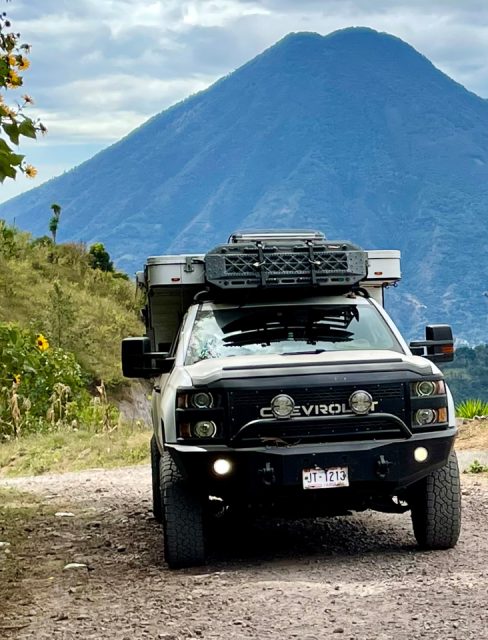Heidi and Jens, full-time overlanders for 15 years, are the real deal. They’ve crossed rivers in Mongolia, the Canning Stock in Australia, and the salt flats of Bolivia. Jens boasts a Unimog tattoo from a parlor in Shanghai; Heidi cooks Kashmiri curry and speaks five languages. We met in Oaxaca, Mexico, in one of those wonderfully serendipitous encounters overlanders live for, hoping to break the isolation of travel over a meal and an exchange of stories. The conversation turned to our kids, with Heidi and Jens curious about their impressions of life on the road.
“Good and bad,” my wife, Phoebe, and I declared in unison.
Meet the Kids
Oliver, our 14-year-old son, is a rock. Nailbiting storms, cold, heat, ear infections, and bouts of stomach sickness roll off him like water. The world is his fishing map or a place to string a hammock and read A River Runs Through It and The Old Man and the Sea. I am convinced he’ll be an overlander the rest of his life, fired up by this one-year trip on the North American continent, this brief but potent interlude in his youth.
Perry, our 9-year-old daughter, is sassy, smart, and highly strung. She calls herself a city girl, loftily denouncing rural life, insects, pastoral odors, and earthly discomfort. Her plans for the future include a snow kitten, a career in interior design, and an apartment in a Manhattan high-rise, far removed from the earth’s sordid surface and unruly weather. Perry has struggled on this trip. She misses her friends, her neighborhood, her school. She has had several breakdowns made worse by her awareness of my uncompromising passion for overlanding and the ease with which her brother is handling the trip. Tears have soaked her bunk many a night in the camper. “I’m such a loser!” she has said. “You should get a different daughter to travel with.”
Jens and Heidi nodded sagely. “Children need their stability. Long-term overlanding should be limited to adults,” they advised.
I was shocked. “You can’t be serious,” I said. “With your credentials, I thought you’d be diehard advocates for families overlanding with children.”
“Short term, yes,” Jens said. “But not for more than a year or two at most.”

The advice of others
Heidi related a story about a Swiss family they met on the road whose teenage son was desperately unhappy for reasons similar to Perry’s. The family had been overlanding for three years and had no intentions of quitting soon. “He spent hours pouring his soul out to us. It was so sad,” Heidi said.
“Maybe he had [crappy] parents,” I said. “Maybe they were overbearing and controlling.”
“No,” Jens smiled, “They were nice.” He just wanted to be back home, playing soccer and hanging out with his friends.”
The conversation struck a nerve. It took single-minded passion to pull off an overlanding trip like ours at the cost of jobs and careers, bank accounts, and the sensitivities of partners and young children. There was the hope that this one year on the road would morph into something longer and more permanent: a world journey for Phoebe and me, a coming-of-age odyssey for our children. I was deeply invested. But Phoebe and Perry saw it differently. Theirs was strictly a 12-month adventure, bookended by the stability and comfort of home, the familiar, the known. Even Oliver shared this finite view as if spoken to by the many fish he’d caught and released in Montana and Idaho and the Sea of Cortez, who hovered in the shallows for a moment, stunned and iridescent, then flashed away forever.
We carry assumptions about the things that are good and bad for children. School, sports, music, travel, and college are seen as conventionally good. Social separation and isolation are seen as bad. But hold on. Didn’t Oliver and Perry do remarkably well holed up at home during the pandemic? Didn’t Oliver’s grades stay consistently high? Did Perry not discover baking, gardening, and the joy of long walks with parents able to work remotely? Covid had been a boon for our family, pulling us together in a way we had never experienced before except around the dinner table once a day.

Sometimes the things we see as negative have positive outcomes when experienced up close. Similarly, some things we accept as positive for our children may have adverse consequences: overachievement, stress, burnout, the spiritual emptiness of material wealth or the lack thereof, alcoholism, substance abuse, self-harm, and suicide. I have met overlanders who are drunks and depressives, take drugs, and struggle with their well-being. But all were afflicted in these ways before they started overlanding. I don’t know of anyone who has self-destructed due to overlanding. It may not hold the cure, but it is rarely, if ever, the cause.
With this reasoning, it’s easy for me to dismiss Perry’s difficulties on our trip as adjustment pains, symptoms of her age, and her upbringing in the artificial sanctity of an American suburb that she has constructed as safe and nurturing. She is too young to know what is good for her. She needs time to adjust, to shake her preconceptions, to open her heart to overlanding, which must, to paraphrase the Persian poet Rumi, “violently sweep your house empty of its furniture” before you can usher in its wonders and delights.
The harsh reality
But Perry has not adjusted. Three months into the trip, it is her family who must adapt with fewer route changes and more visits to friends, hotel rooms, and amusement parks. Still, the tears and self-deprecation come almost daily. In Baja, we brought aboard a cyber therapist who listened intently and recommended frank, compassionate discussions and calming exercises, aided by age-appropriate apps that we downloaded when we had connectivity. We held short meditation sessions with Perry, usually by the side of a river or swimming pool, where the water’s surface is much like the mind—calm one minute, disturbed the next, then calm again. We saw some beneficial results. Perry started photographing flowers, drawing, swimming with enthusiasm, and playing more with Oliver. But then she spiraled, again and again, engulfed by a darkness she could hardly describe other than to connect to the trip and its gritty conditions, constantly drifting from place to place, never home, never stable. It got so intense that Phoebe broke into tears, overcome by a sense of maternal failure and helplessness. For the first time, we considered the need to abort the trip, which plunged me into depression. How could we quit now, four months into a year-long journey I’d been dreaming about for a decade, for which we’d saved up for years and given up our jobs and home? It was inconceivable.
We carried on, slow-traveling Baja, mainland Mexico, and Guatemala. We camped on secluded beaches, went whale shark diving, visited ornate cathedrals, and picnicked in the cool shadows of Mayan brickwork. In Lake Atitlan, for two weeks, we escaped the confines of our camper and rented a lovely house on the shores of the caldera with separate bedrooms, flushing toilets, and hot running water. Perry was in heaven. There was no spiraling. She seemed whole, fully healed. But on the other side of these two weeks were more miles and more roads, as paradoxical as our lives themselves. Each road, each life, leads somewhere but also nowhere, to destinations that are also departure points, fated to transform as if thrown by a switch. What sensitive child would fail to be tortured by such a riddle?

Arriving at compromise
In Chiapas, on the way back from Guatemala, the decision was made. In two weeks, Phoebe and Perry would fly back to the United States. Oliver and I would continue in the camper and slowly head back home, camping, fishing, and exploring along the way. The family had stuck together for eight months. Perry had endured. We had endured.
I am proud of her, of us. We are four months short of our goal of a year together on the road. But eight months in a truck camper the size of a shoebox, with no onboard toilet, no hot water, and no shower, is an achievement nonetheless. We can claim to be overlanders. Perry has stories to tell, and they are not all bad. In fact, very few are. It’s just that the bad ones are bright and cold as a laser, cutting through the good stuff, leaving her fondest memories hot to the touch and brittle. Maybe they will cool with time. Maybe one day, she can sort her memories the way she sorts her seashells and digital images of flowers, keeping the most colorful and interesting, discarding the fissured ones shorn of color, whispering of hardship and pain.
Overlanding is a better life for me. I feel it, know it, deep inside of me, planted there by my gypsy father who could never stay put, who needed to travel to feel alive, who eventually lay frail and delirious on his deathbed as he rasped in my ear, “How is the diesel in Vietnam?”

Overlanding may be a better life for Oliver, too. He’s already an outstanding travel partner, capable with a fly rod, an ax, a spare tire—always inquisitive and resourceful. For now, he’s excited to get back home, renew his friendships, and brag about the 22,000 miles he’s clocked and the fish he’s landed in some of the wildest regions of North America. He wants to go to college and become a pediatrician. That may be his calling, but the road and the wilderness will beckon to him, too, a calling this year’s adventures have taught him to recognize.
Heidi and Jens, my overlanding idols, were too rigid and absolutist in their verdict. For raising children, the overlanding life is as good a context as any, perhaps even better than a sedentary one. But in one respect, they were correct. Not all children thrive in the overlanding life. Not all children (nor all adults) are equally cut out to be nomads—to conquer the pull of stability, comfort, and convention. A few may grow into this lifestyle. Maybe we needed to be on the road longer for Perry to do so. For a child Perry’s age, that may seem like a lifetime. And who knows? Perry may still discover the call of the road. But for now, she needs stability and perspective. She needs to pick up her old suburban life, see it anew, and make her own choices.


